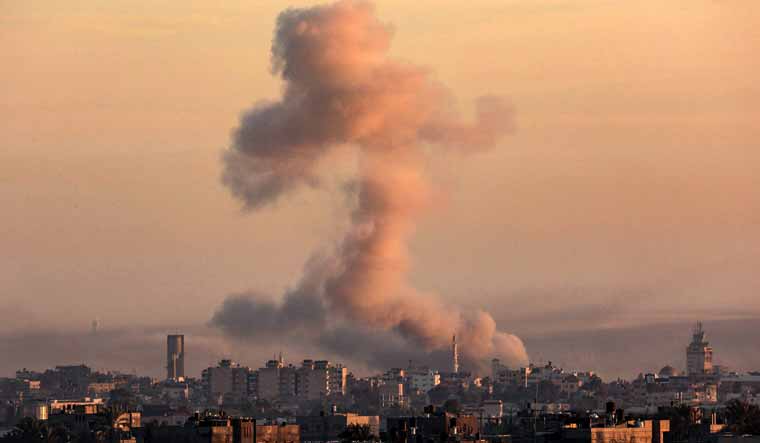Even as the United States vetoed a UN Security Council demand for an immediate ceasefire in Gaza, Israel continued to press its offensive in the Palestinian enclave, with airstrikes in Jabaliya in northern Gaza and Khan Younis in the southern part.
On Saturday, Israel's Arabic-language spokesperson posted a map on X highlighting six blocks of Khan Younis, urging the residents to evacuate "urgently".
"We try to put the children to sleep and we stay up fearing the place would be bombed and we'll have to run carrying the children out," Zainab Khalil, 57, displaced near Jalal street where evacuations were ordered, told Reuters. "During the day begins another tragedy, and that is: how to feed the children?"
Though Israel has designated a narrow patch of barren southern coastline, Muwasi, as a safe zone, Gaza residents claimed airstrikes and shelling were happening in many "safe areas", including at Rafah near the Egyptian border.
The IDF jets reportedly carried out 30 airstrikes, destroying the two main roads connecting Rafah City to Khan Younis and the rest of the Gaza Strip. This is making movement very difficult for people trying to arrive here from Khan Younis, reported Al Jazeera.
Muwasi also lacks basic amenities with overcrowding and no sanitation facilities. They faced an overnight temperature of around 11 degrees Celsius (52 degrees Fahrenheit). "I am sleeping on the sand. It’s freezing," Soad Qarmoot, a cancer patient forced to leave her home in the northern town of Beit Lahiya, told AP.
“We need a solution. If you’re waiting for us to die, for sure – in three weeks’ time people are going to die from no food, no medicine, no medication, no nothing,” said Yaser Abu Asi, a displaced Palestinian in al-Mawasi.
Palestinian residents also claim that Israeli tank shelling continues in central Gaza on Bureij and Maghazi refugee camps. Palestinian health officials reported an Israeli air strike in Bureij killed seven Palestinians.
Meanwhile, reports from Israel claim that the current intense fighting in the Gaza Strip could go on for two more months. There will be no ceasefire after that period, The Times of Israel quoted unnamed sources.
During the next two months, there will be attempts to advance more deals to release more hostages, the report says.
At some point in the next two months, Israel will allow some Gaza residents to return to their homes, Kan reports, saying this is "a US demand and also an operational necessity", the report added.


